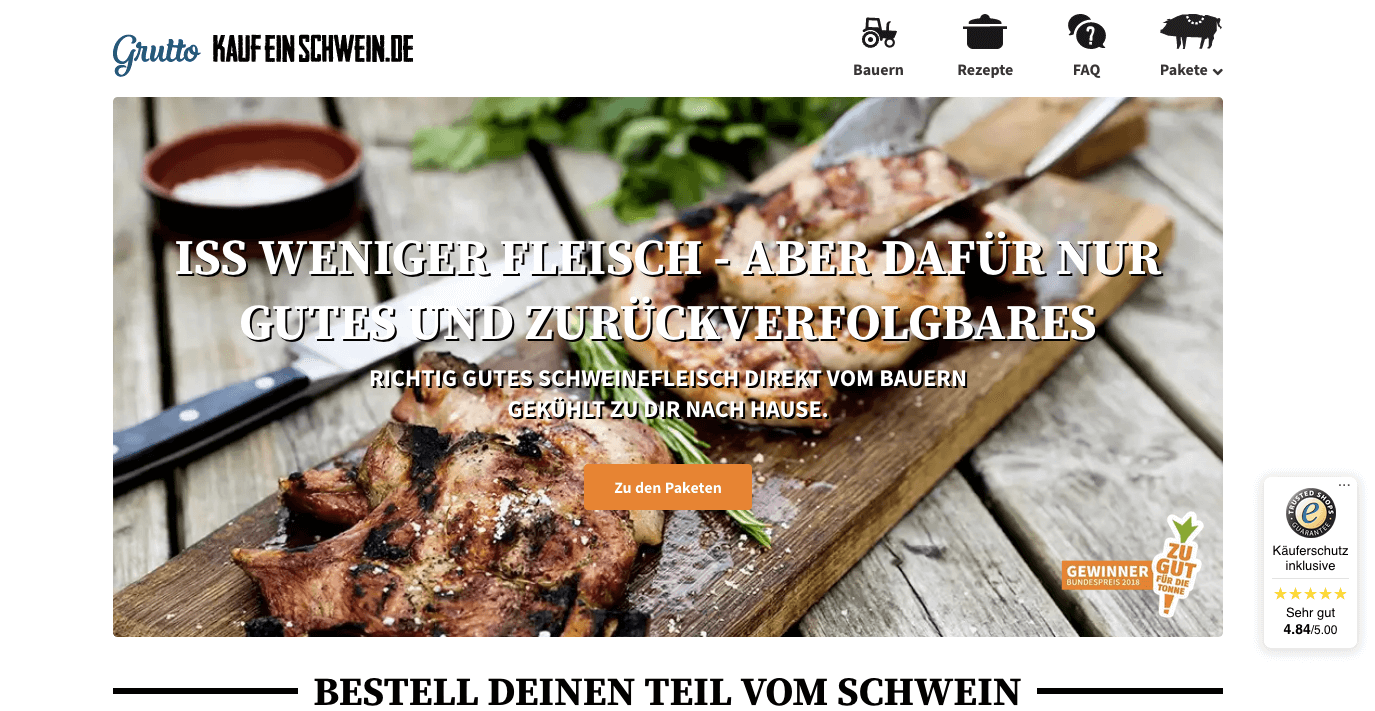What is meant by livestock farming?
Livestock farming refers to economically oriented animal husbandry with high stocking densities and high mechanisation. Various farm animals the same species and age group are kept in a very limited space in order to produce the largest quantity of meat and animal products in the shortest possible time with the least possible effort and personnel. In Germany alone, around 763 million animals live and die in livestock farming every year (status 2019).
In poultry farming, the number of animals per farm has increased with the farms having 100,000 hens huddled together in the tightest spaces. To keep production costs as low as possible, there are ultra-modern farming houses designed for efficiency, without any sleeping or walking areas for the animals.
What does factory farming mean for the animals?
The basic needs of the animals are ignored as they are kept in narrow and unstructured environment which prevents species-specific behaviour.
No opportunity for social behaviour leads to stress, restlessness, aggressiveness and frustration.
Risks from poor health, infections and susceptibility to diseases are increasing. In order to prevent the animals from injuring or eating each other, painful manipulations are carried out without anaesthesia and the animals are subjected to control measures like beak trimming in chicks (hens, turkeys) and teeth or horns removal.
How can the situation be improved?
- Providing better living conditions with adequate space
- Distributing animals in appropriate groups to promote social behaviour
- Offering possibility of outdoor exercise
- Providing sufficient opportunities for movement
- Allowing daylight and structured environment
If animals are allowed to perform species-specific behaviour, painful manipulations may not be required, thus resulting in cost cutting. However, awareness of the factory owners is necessary in that case.
How does livestock farming affect climate change?
Climate change poses a threat to food security, water availability and biodiversity worldwide and is a major cause of environmental disasters. The production and consumption of animal products is a major driver of climate change, while a plant-based diet helps to reduce greenhouse gas emissions.
5 Solutions for promoting animal welfare
Here we present some initiatives and companies that are committed to animal welfare. While the most effective way to ensure animal welfare is a vegan diet, there are also other ways in which one (as a meat eater) can contribute to more animal welfare.
The Vegan Taste Week
The Albert Schweitzer donation for animal welfare offers a useful website, which gives Tips to all beginners who would like to switch to a vegan lifestyle. They answer questions like how do I actually manage such a week without animal food? What do I buy? How do I prepare the food? The website provides more than 400 recipes, as well as everyday tips, weekly plans and lots of background information. Click here for the Vegan Taste Week website.

Cow sharing
Those who cannot yet stop eating meat (and are not convinced by the vegan taste week so far) should pay attention to where the meat comes from. At besserfleisch, the cattle, which live on the pasture all year round, are only slaughtered when the meat from their entire body has been bought. "For this we pay our farmers a fair price far above the usual market price. In return, we get great beef: from healthy animals, with plenty of exercise on lush pastures." The motto: Eat lesser, but better and healthier meat.
buyeinschwein.de
Artistically appropriate, transparent and without wastage is also what Kaufeinschwein.de offers. When buying on the website, one can click on the meat parts that they wish to order (e.g. pig chops). If all parts of the pig gets chosen by different customers, then the whole meat is sold and the animal is slaughtered. The delivery packages contain everything you want, from medallions to bratwurst. By the way, the same options exist for buying a cow or a chicken.

My little farm
The team of Meine kleine Farm supports regional organic farmers from whom it obtains the meat. The animals of these farmers live on meadows and pastures. Here, too, the motto is: Better less, but better.
The chicken mobile
The huenermobil.de promotes the use of movable chicken stalls that can be pulled by tractors. This way, the chicken coop is always at a different spot on the farmer's land. The disadvantages of stationary cages like silting and balding of the soil and illnesses such as diarrhoea or worm infestation are prevented. The animals have permanent access to an attractive outdoor run and plenty of activity in the countryside. And this is advantageous for laying eggs!
Translation from German to English: Sayanti Sengupta



















